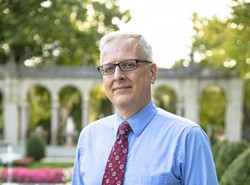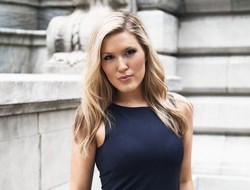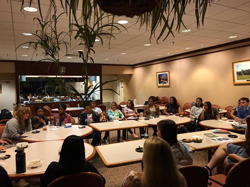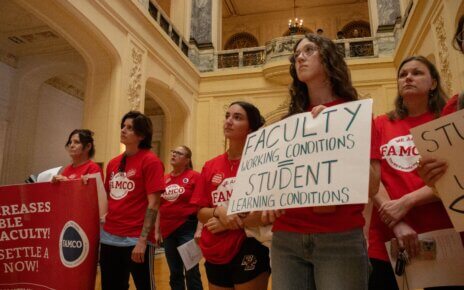Patrick Murray, Director of the Monmouth University Polling Institute, held a virtual discussion with political reporter Olivia Nuzzi on Monday, Mar. 29.
Rekha Datta, Ph.D., Interim Provost & Senior Vice President for Academic Affairs, introduced Nuzzi and shared the context behind the discussion.
“This event is part of a Monmouth University Polling Institute Initiative to foster thought provoking conversation on a wide range of topics beyond typical election polling or horse-race politics,” Datta said. “From our own backyard, but of national fame, we are very privileged, honored and delighted to have Olivia Nuzzi [join us].”
 Murray wanted to interview Nuzzi because he considers her to be someone who captures the recent changes in political society and culture, as she, “Represents a direction that we’re taking right now, overall as a country as well in terms of politics and in terms of Journalism,” he said.
Murray wanted to interview Nuzzi because he considers her to be someone who captures the recent changes in political society and culture, as she, “Represents a direction that we’re taking right now, overall as a country as well in terms of politics and in terms of Journalism,” he said.
Nuzzi began her career in local Monmouth County politics, interning with a District 11 Assembly race for Vin Gopal, who is now part of the New Jersey Legislature. She began a blog about national politics, eventually being asked to become a dissenting liberal voice on Art Gallagher’s conservative blog, More Monmouth Musings.
She wrote a piece on state level issues that had drawn the attention of Tri-City News. The organization asked Nuzzi to become a columnist, her first paid work over a year-or-so long employment.
Nuzzi’s political interests began at a young age. She watched former New Jersey Governor Jim McGreevey’s appearance on The Oprah Winfrey Show, his proclamation of “I am a gay American” sparking an interest in the way that political language differs from everyday verbiage.
“I must have been 11 or so at that time, and I remember thinking that it was very interesting that political language was not really like regular english,” Nuzzi said. “It was something a little bit different and I had an innate understanding of it.”
Nuzzi was also interested in comedy at the time, another encouragement to keep up to date with politics as many comics center their acts around it. “I was paying a lot of attention to the news, really, just so I could be in on the joke and keep up with what people were talking about.”
Becoming a speechwriter seemed like an interesting prospect, but she quickly realized that the field did not align ideologically with her interests after giving it a try. “I was not interested in helping someone lie, which kind of became clear to me as part of what that job is,” she said.
Nuzzi loved the idea of interviewing someone, considering it the best possible job you could have. “Learning about another person’s life, beliefs and being able to ask them whatever you wanted seemed kind of amazing to me,” Nuzzi said.
“You have a very unique voice that’s unfiltered in many ways,” Murray said to Nuzzi. “Were [the two publications you began with] influential in your style or were you looking at other folks?”
“I just really wanted to write things that I would want to read,” Nuzzi said. I’m definitely a student of new journalism, and I think my style is very much in line with the history of new Journalism of the last half century or so. [The style] definitely has a point of view but it’s not ideological and is really just more about a sense of right and wrong.”
Nuzzi now serves as the Washington correspondent for New York Magazine. “You’re kind of like a feature writer-style, but the topics that you write about aren’t technically features,” Murray said. “You’re fit within New York Magazine, what are they trying to get from you [during an assignment]?” Murray asked.
“My job is just to report back in the most human way possible,” Nuzzi responded. “What this universe is like, what people are like and what their motives are. I kind of have license to observe from 10,000 feet and to write about the bigger picture. I try and write more about what it all means at the end of the day and what it all means in the broader context of our lives.”
“Not a lot of places are really about that type of slow journalism, if you will,” Nuzzi continued. “It’s definitely a privileged position at any magazine in this media environment but certainly at New York Magazine.”
Murray asked Nuzzi if she could offer any advice to a young person who is considering getting into political journalism.
“My main piece of advice would just be to try really hard to understand the people that you’re writing about and to be empathetic,” Nuzzi said. “Try to think about the human beings that you’re covering and what the human effect is of whatever issue you’re covering. I think it’s very easy to kind of forget that we’re writing about other human beings and that that should be the main consideration.”
“I think it’s very easy to get into these philosophical political debates or to jump on these bandwagons of attacking people, or being overly simplistic about complicated ideas, and I think the most important thing is to kind of slow down and think about the human effect of the things that we’re writing about,” Nuzzi continued.
In terms of entering the industry, Nuzzi considers it to be a case-by-case basis.
“Some people can afford to do an unpaid internship and that’s their way, but a lot of people cannot do that and they have to find other ways to be able to freelance or to get their foot in the door,” Nuzzi said. “It’s really just about figuring out what’s realistic for you in terms of opportunity, finding connections and networking with people.”
PHOTO TAKEN from Daily News
PHOTO COURTESY of Chris Spiegal



